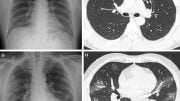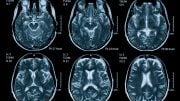
Researchers found that people who tested positive for COVID-19 had a 4.8 times increased risk of intracerebral hemorrhage (bleeding in the brain), 3.5 times increased risk of Alzheimer’s disease, 2.6 times increased risk of Parkinson’s disease, and 2.7 times increased risk of ischaemic stroke.
COVID-19 positive outpatients are at a far increased risk of neurodegenerative disorders compared with individuals who tested negative for the virus, a new study presented today at the 8th European Academy of Neurology (EAN) Congress has shown.
The research study, which analyzed the health records of over half of the Danish population, found that those who had tested positive for COVID-19 were at a much higher risk of Alzheimer’s disease, Parkinson’s disease, and ischaemic stroke.
Out of 919,731 individuals that were tested for COVID-19 within the study, researchers found that the 43,375 people who tested positive had a 3.5 times increased risk of being diagnosed with Alzheimer’s disease, 2.6 times with Parkinson’s disease, 2.7 times with ischaemic stroke, and 4.8 times with intracerebral hemorrhage (bleeding in the brain). While neuroinflammation may contribute to an accelerated development of neurodegenerative disorders, the authors also highlighted the implications of the scientific focus on long-term sequelae after COVID-19 (so-called long COVID).
The study analyzed in- and outpatients in Denmark between February 2020 and November 2021, as well as influenza patients from the corresponding pre-pandemic period. Researchers used statistical techniques to calculate relative risk, and results were stratified for hospitalization status, age, sex, and comorbidities.
Dr. Pardis Zarifkar, lead author from the Department of Neurology, Rigshospitalet, Copenhagen, Denmark, explained, “More than two years after the onset of the COVID-19 pandemic, the precise nature and evolution of the effects of COVID-19 on neurological disorders remained uncharacterized. Previous studies have established an association with neurological syndromes, but until now it is unknown whether COVID-19 also influences the incidence of specific neurological diseases and whether it differs from other respiratory infections.”
The increased risk of most neurological diseases was, however, no higher in COVID-19-positive patients than in people who had been diagnosed with influenza or other respiratory illnesses. COVID-19 patients did have a 1.7 times increased risk of ischaemic stroke in comparison to influenza and bacterial pneumonia in patients over 80 years of age.
The frequency of other neurodegenerative illnesses such as multiple sclerosis, Guillain-Barré syndrome, myasthenia gravis, and narcolepsy did not increase after COVID-19, influenza, or pneumonia.
Dr. Pardis Zarifkar added, “We found support for an increased risk of being diagnosed with neurodegenerative and cerebrovascular disorders in COVID-19 positive compared to COVID-negative patients, which must be confirmed or refuted by large registry studies in the near future. Reassuringly, apart from ischemic stroke, most neurological disorders do not appear to be more frequent after COVID-19 than after influenza or community-acquired bacterial pneumonia.”
“These findings will help to inform our understanding of the long-term effect of COVID-19 on the body and the role that infections play in neurodegenerative diseases and stroke.”
Reference: Frequency of neurological diseases after COVID-19, influenza A/B and bacterial pneumonia, presented at the EAN Congress 2022.
Dr. Pardis Zarifkar is from the Department of Neurology at Rigshospitalet, Denmark.









Yet the one sentence in this article that brings it down to Earth is: “The increased risk of most neurological diseases was, HOWEVER, NO higher in COVID-19-positive patients than in people who had been diagnosed with influenza or other respiratory illnesses.”
I have questions about the study: What were the health conditions of those tested? Did they have co-morbidities? Did they have a high BMI? How old were they? And those who are vaccinated, but STILL got Covid anyway, are they susceptible as well?
Also, the headline of this article is fear-mongering to the public and clickbait; this diminishes all the more trust in the general media. I’d like to see what the Lancet says and other peer-reviewed medical journals.
“… apart from ischemic stroke, most neurological disorders do not appear to be more frequent after COVID-19 than after influenza or community-acquired bacterial pneumonia.”
This article appears to have been rewritten to create a click-bait headline. The lede should probably read, A large cohort study of Danish medical records has found that the risk of most neurodegenerative diseases is not greater among Covid 19 patients than among patients diagnosed with influenza or pneumonia.”
It’s also not clear that the cart has not placed before the horse: Does the article mean to say that Covid patients were more likely to have been diagnosed with Parkinsons or Alzheimers, suggesting those pre-existing conditions raised the likelihood of infection?